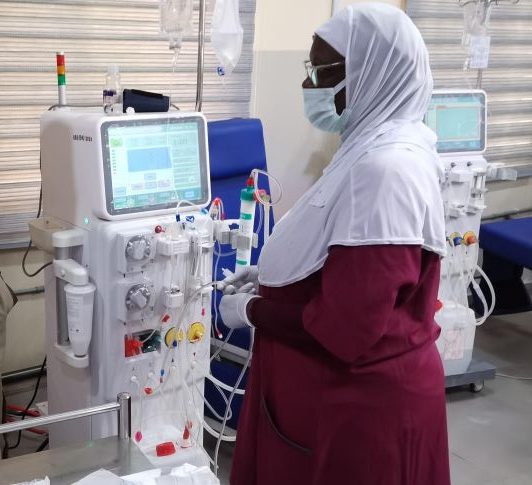While the Yobe State government provides free kidney dialysis services to patients, the Federal Government’s recent decision to fix a maximum charge of ₦12,000 for dialysis sessions in some tertiary medical facilities is equally commendable.
Both interventions are particularly beneficial to people suffering from Chronic Kidney Disease (CKD), a condition that may require as many as three costly dialysis sessions every week.
Experts explain that CKD can be managed through several procedures such as blood pressure control, diabetes management, treatment of infections, dietary changes, fluid regulation, and lifestyle modifications. Dialysis and kidney transplants, however, become necessary in severe cases.
A report by Grandville Medical and Laser Centre, Lagos, affirmed that:
“Kidney failure is expensive and deadly. Dialysis and kidney transplants are costly, leaving many patients unable to afford treatment. Many people with kidney disease in Nigeria die due to lack of funds for ongoing care.”
The report estimated that about 25 million Nigerians suffer from CKD and require costly treatment. In some private hospitals in Lagos, a single dialysis session costs between ₦50,000 and ₦100,000—clearly beyond the reach of patients living below the poverty line.
A statement issued on August 20, 2025, by the Deputy Director (Information) in the Federal Ministry of Health and Social Welfare, Mr. Alaba Balogun, announced that the ₦12,000 rate per dialysis session is available at the following institutions: Aminu Kano Teaching Hospital, Kano; University of Maiduguri Teaching Hospital; Abubakar Tafawa Balewa University Teaching Hospital, Bauchi; University of Jos Teaching Hospital; and the National Hospital, Abuja.
Others include the Federal Medical Centre, Ebute Metta, Lagos; University College Hospital, Ibadan; University of Benin Teaching Hospital; Federal Medical Centre, Yenagoa; Federal Teaching Hospital, Owerri; and the Federal Medical Centre, Abakaliki.
The inclusion of the Aminu Kano Teaching Hospital (AKTH) came after Solacebase, a Kano-based online newspaper, highlighted its initial omission. The hospital’s addition is significant as it has dozens of dialysis machines, consultant nephrologists and urologists, trained nephrology nurses, and qualified technicians. It also hosts two dialysis centres built and equipped by Kano businessmen, Alhaji Aminu Alhassan Dantata and Alhaji Aliyu Sa’idu Bebeji.
The new Aliyu Sa’idu Bebeji Kidney Dialysis Centre is a self-sustaining waqf (Islamic endowment) facility equipped with a 20,000-litre water treatment plant, disinfectant production equipment, and a dedicated power supply system.
According to the Head of the Centre, RN Bashir Ahmed, the Alhassan Dantata Dialysis Centre alone houses 12 dialysis machines. With the combined resources of both centres, AKTH is well-positioned to meet the growing demand for kidney dialysis services.
Ahmed further disclosed that the new ₦12,000 fee has already had a positive impact. Patients who could previously afford dialysis only once a week can now undergo treatment two or even three times weekly.
This initiative has provided real, direct relief to ordinary Nigerians struggling with the financial weight of kidney disease.
Unfortunately, kidney diseases, along with diabetes, hypertension, and depression, remain widespread in the country. Research commissioned by the administration of Governor Mai Mala Buni in Yobe State paints a grim picture of CKD prevalence nationwide. The Yobe study is considered the largest state-funded disease research project in Africa.
The researchers focused on communities along the River Yobe and found that CKD, diabetes, and hypertension—especially among fishing families—were linked to poor nutrition, inadequate sanitation, and exposure to harmful chemicals and heavy metals in untreated water.
To ease the burden, the Yobe State government shoulders the ₦50,000 cost of each dialysis session. Governor Buni’s administration spends more than ₦360 million annually on free dialysis services.
According to the Chief Medical Director of the Yobe State University Teaching Hospital, Dr. Baba Waru Goni, over 60 dialysis sessions are conducted weekly.
“This is a lifeline for patients who would otherwise be unable to afford the treatment,” Dr. Goni said.
He added: “Government bears this cost because there is no way an individual or family already struggling with the financial devastation of renal failure can afford it.”
Records show that over 50,000 dialysis sessions were funded by the Yobe State government between 2019 and June 2024.
Salisu Na’inna Dambatta is an advocate for Medical Journalism.
📞 0810 663 2271


